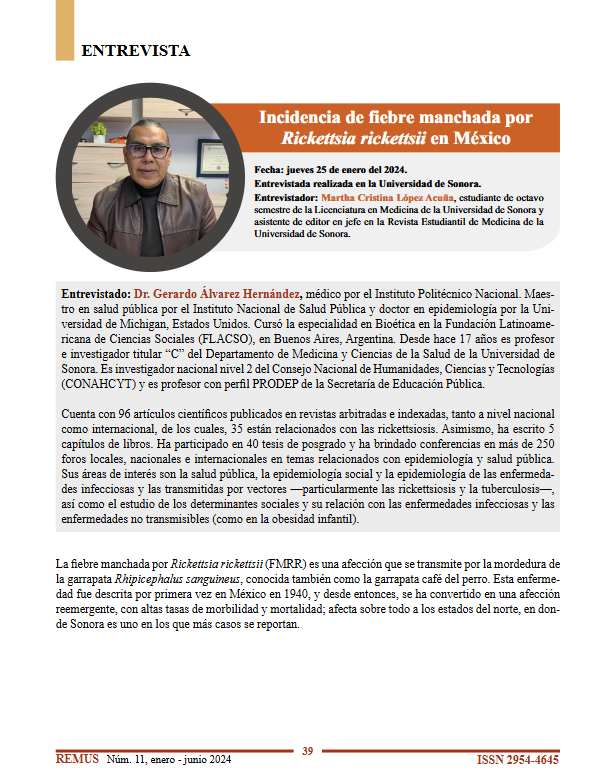Incidence of spotted fever caused by Rickettsia rickettsii in Mexico
DOI:
https://doi.org/10.59420/remus.11.2024.201Keywords:
Tick, Rickettsiosis, Doxycycline, PreventionAbstract
Rocky Mountain spotted fever (RMSF) remains the deadliest infectious disease in Sonora, Mexico. In an interview with infectious‑disease expert Dr. Juan Álvarez, several factors behind the unusually high incidence are explored. First, the Rickettsia rickettsii strains circulating in north‑western Mexico are genetically more virulent than those in the east. Second, Sonora has pioneered molecular diagnostics for RMSF, so more cases are actually detected and reported. Climate alone cannot explain the burden: the brown dog tick (Rhipicephalus sanguineus) thrives anywhere that daytime temperatures stay between 7 °C and 30 °C—and in yards littered with debris, high weeds and free‑roaming dogs.
Public‑health efforts focus on two fronts: (1) early clinical suspicion and immediate doxycycline within the first three days of fever to avert the vasculitis‑driven multi‑organ failure that kills patients—especially children—and (2) vector control, which hinges on responsible pet ownership, topical acaricides or tick collars, sterilization campaigns to reduce stray dogs, and community clean‑up of patios. Socio‑economic factors amplify risk: lower‑income neighborhoods have more dogs, poorer yard sanitation and less access to health education.
Diagnostic advances—PCR and other molecular tests—offer speed, yet remain scarce outside Sonora. A promising research avenue is a canine anti‑tick vaccine that could break the transmission cycle. Nevertheless, Dr. Álvarez stresses that no new drug beats prompt doxycycline, which has never encountered resistance and costs under US$6 per treatment course in Mexico. Effective control will require trans‑disciplinary collaboration among physicians, veterinarians, biologists, sociologists and local authorities, with every stakeholder—from clinicians to pet owners—sharing responsibility.
Downloads

Downloads
Published
How to Cite
Issue
Section
License
Copyright (c) 2024 REMUS - Revista Estudiantil de Medicina de la Universidad de Sonora (Journal of Medical Students' of the University of Sonora)

This work is licensed under a Creative Commons Attribution-NonCommercial-NoDerivatives 4.0 International License.

